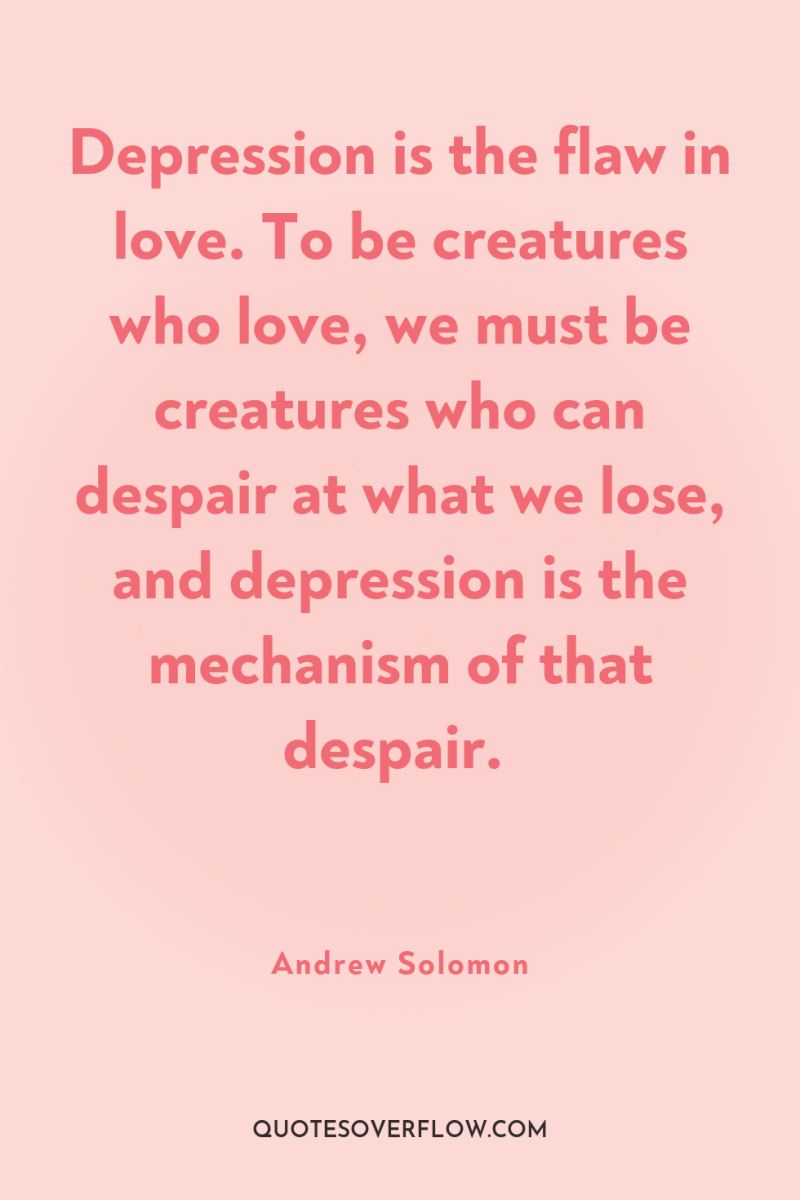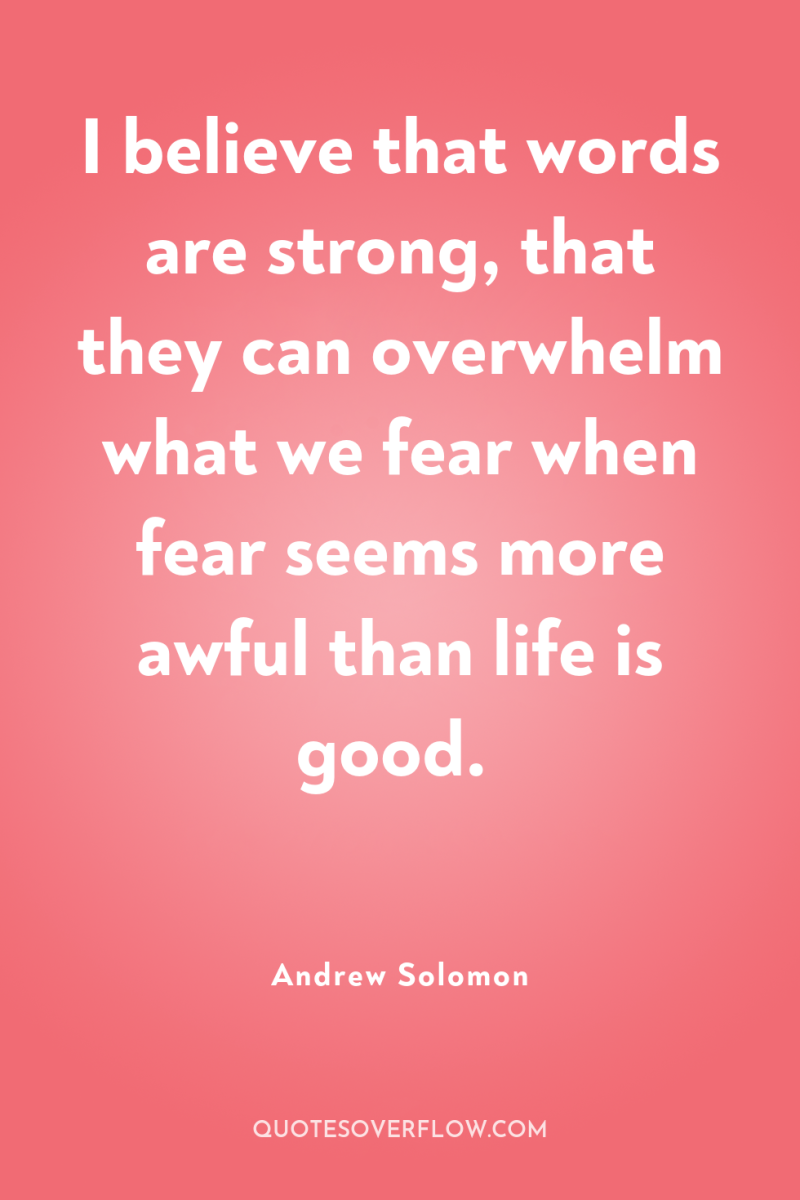1
It is important not to suppress your feelings altogether when you are depressed. It is equally important to avoid terrible arguments or expressions of outrage. You should steer clear of emotionally damaging behavior. People forgive, but it is best not to stir things up to the point at which forgiveness is required. When you are depressed, you need the love of other people, and yet depression fosters actions that destroy that love. Depressed people often stick pins into their own life rafts. The conscious mind can intervene. One is not helpless.Andrew Solomon

2
Depression is the flaw in love. To be creatures who love, we must be creatures who can despair at what we lose, and depression is the mechanism of that despair.Andrew Solomon

3
I believe that words are strong, that they can overwhelm what we fear when fear seems more awful than life is good.Andrew Solomon
4
Antonin Artaud wrote on one of his drawings, "Never real and always true, " and that is how depression feels. You know that it is not real, that you are someone else, and yet you know that it is absolutely true.Andrew Solomon
5
While people argue with one another about the specifics of Freud's work and blame him for the prejudices of his time, they overlook the fundamental truth of his writing, his grand humility: that we frequently do not know our own motivations in life and are prisoners to what we cannot understand. We can recognize only a small fragment of our own, and an even smaller fragment of anyone else's, impetus.Andrew Solomon
6
You are constantly told in depression that your judgment is compromised, but a part of depression is that it touches cognition. That you are having a breakdown does not mean that your life isn't a mess. If there are issues you have successfully skirted or avoided for years, they come cropping back up and stare you full in the face, and one aspect of depression is a deep knowledge that the comforting doctors who assure you that your judgment is bad are wrong. You are in touch with the real terribleness of your life. You can accept rationally that later, after the medication sets in, you will be better able to deal with the terribleness, but you will not be free of it. When you are depressed, the past and future are absorbed entirely by the present moment, as in the world of a three-year-old. You cannot remember a time when you felt better, at least not clearly; and you certainly cannot imagine a future time when you will feel better. .Andrew Solomon
7
Since I am writing a book about depression, I am often asked in social situations to describe my own experiences, and I usually end by saying that I am on medication. “Still?” people ask. “But you seem fine! ” To which I invariably reply that I seem fine because I am fine, and that I am fine in part because of medication. “So how long do you expect to go on taking this stuff?” people ask. When I say that I will be on medication indefinitely, people who have dealt calmly and sympathetically with the news of suicide attempts, catatonia, missed years of work, significant loss of body weight, and so on stare at me with alarm. “But it’s really bad to be on medicine that way, ” they say. “Surely now you are strong enough to be able to phase out some of these drugs! ” If you say to them that this is like phasing the carburetor out of your car or the buttresses out of Notre Dame, they laugh. “So maybe you’ll stay on a really low maintenance dose?” They ask. You explain that the level of medication you take was chosen because it normalizes the systems that can go haywire, and that a low dose of medication would be like removing half of your carburetor. You add that you have experienced almost no side effects from the medication you are taking, and that there is no evidence of negative effects of long-term medication. You say that you really don’t want to get sick again. But wellness is still, in this area, associated not with achieving control of your problem, but with discontinuation of medication. “Well, I sure hope you get off it sometime soon, ” they say. .Andrew Solomon
8
People with family histories of alcoholism tend to have lower levels of endorphins- the endogenous morphine that is responsible for many of our pleasure responses- than do people genetically disinclined to alcoholism. Alcohol will slightly raise the endorphin level of people without the genetic basis for alcoholism; it will dramatically raise the endorphin level of people with that genetic basis. Specialists spend a lot of time formulating exotic hypotheses to account for substance abuse. Most experts point out, strong motivations for avoiding drugs; but there are also strong motivations for taking them. People who claim not to understand why anyone would get addicted to drugs are usually people who haven't tried them or who are genetically fairly invulnerable to them.Andrew Solomon
9
The opposite of depression is not happiness, but vitality and my life, as I write this, is vital even when sad. I may wake up sometime next year without my mind again; it is not likely to stick around all the time. Meanwhile, however, I have discovered what I would have to call a soul, a part of myself I could never have imagined until one day, seven years ago, when hell came to pay me a surprise visit. It's a precious discovery. Almost every day I feel momentary flashes of hopelessness and wonder every time whether I am slipping. For a petrifying instant here and there, a lightning-quick flash, I want a car to run me over.. I hate these feelings but, but I know that they have driven me to look deeper at life, to find and cling to reasons for living, I cannot find it in me to regret entirely the course my life has taken. Every day, I choose, sometimes gamely, and sometimes against the moment's reason, to be alive. Is that not a rare joy? .Andrew Solomon
10
I did not want to sit on the roof, though I was also aware that if I didn’t allow myself the relief of considering suicide, I would soon explode from within and commit suicide. I felt the fatal tentacles of this despair wrapping themselves around my arms and legs. Soon they would hold the fingers I would need to take the right pills or to pull the trigger, and when I had died, they would be the only motion left. I knew that the voice of reason (“For heaven’s sake, just go downstairs! ”) was the voice of reason, but I also knew that by reason I would deny all the poison within me, and I felt already some strange despairing ecstasy at the thought of the end. If only I had been disposable like yesterday’s paper! I would have thrown myself away so quietly then and been glad of the absence, glad in the grave if that was the only place that could allow some gladness.Andrew Solomon
11
There is a moment, if you trip or slip, before your hand shoots out to break your fall, when you feel the earth rushing up at you and you cannot help yourself, a passing, fraction-of-a-second terror. I felt that way hour after hour after hour. Being anxious at this extreme level is bizarre. You feel all the time that you want to do something, that there is some affect that is unavailable to you, that there’s a physical need of impossible urgency and discomfort for which there is no relief, as though you were constantly vomiting from your stomach but had no mouth. .Andrew Solomon
12
The opposite of depression is not happiness, but vitality and my life, as I write this, is vital even when sad. I may wake up sometime next year without my mind again; it is not likely to stick around all the time. Meanwhile, however, I have discovered what I would have to call a soul, a part of myself I could never have imagined until one day, seven years ago, when hell came to pay me a surprise visit. It's a precious discovery. .Andrew Solomon
13
If real experience has triggered your descent into depression, you have a human yen to understand it even when you have ceased to experience it; the limited of experience that is achieved with chemical pills is not tantamount to a cure.Andrew Solomon
14
Life itself seemed so alarmingly exigent, to require so much of the self. It was too difficult to remember and think and express and understand - all things I needed to be able to do to talk. To keep my face animated at the same time was insult added to injury. It was like trying to cook and roller-skate and sing and type all at once.Andrew Solomon
15
I chose fat and functional over slender and miserable.Andrew Solomon
16
There is so much pain in the world, and most of these people keep theirs secret, rolling through agonizing lives in invisible wheelchairs, dressed in invisible bodycasts.Andrew Solomon